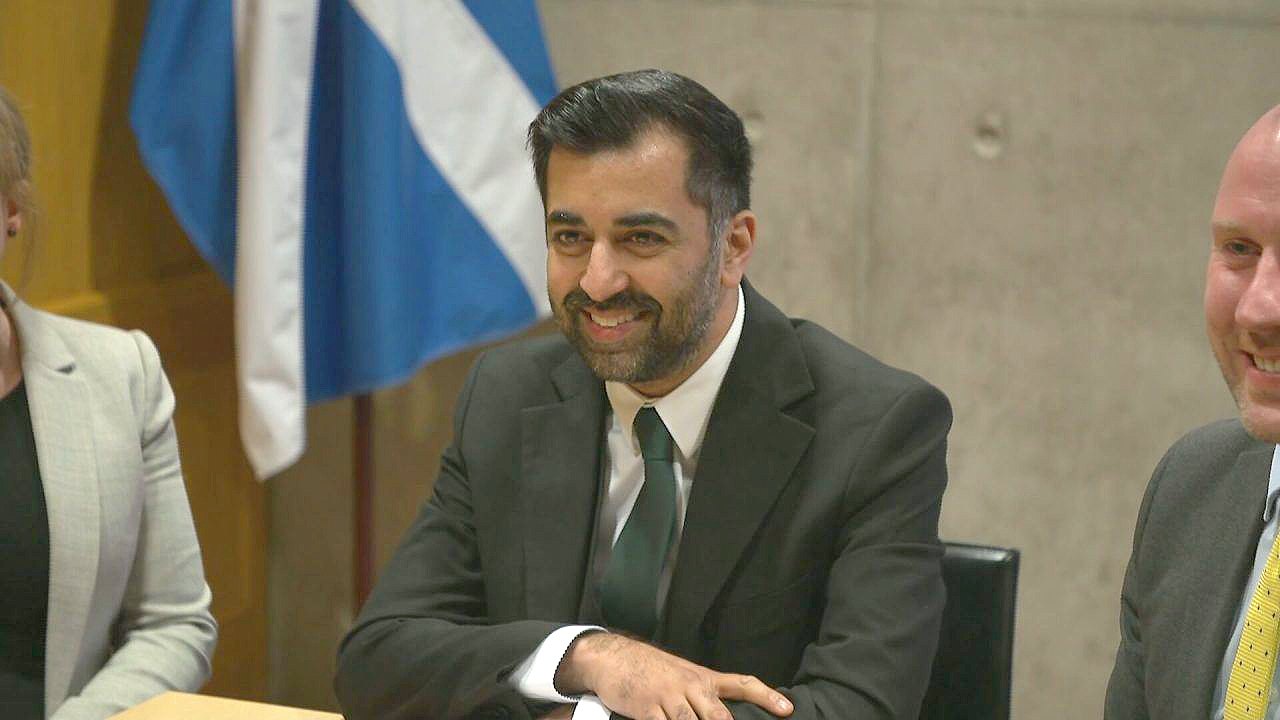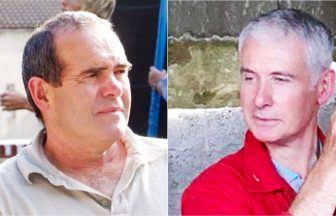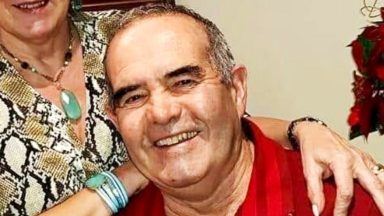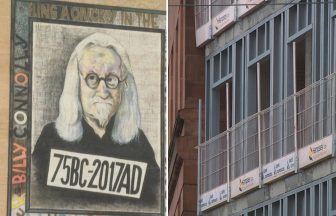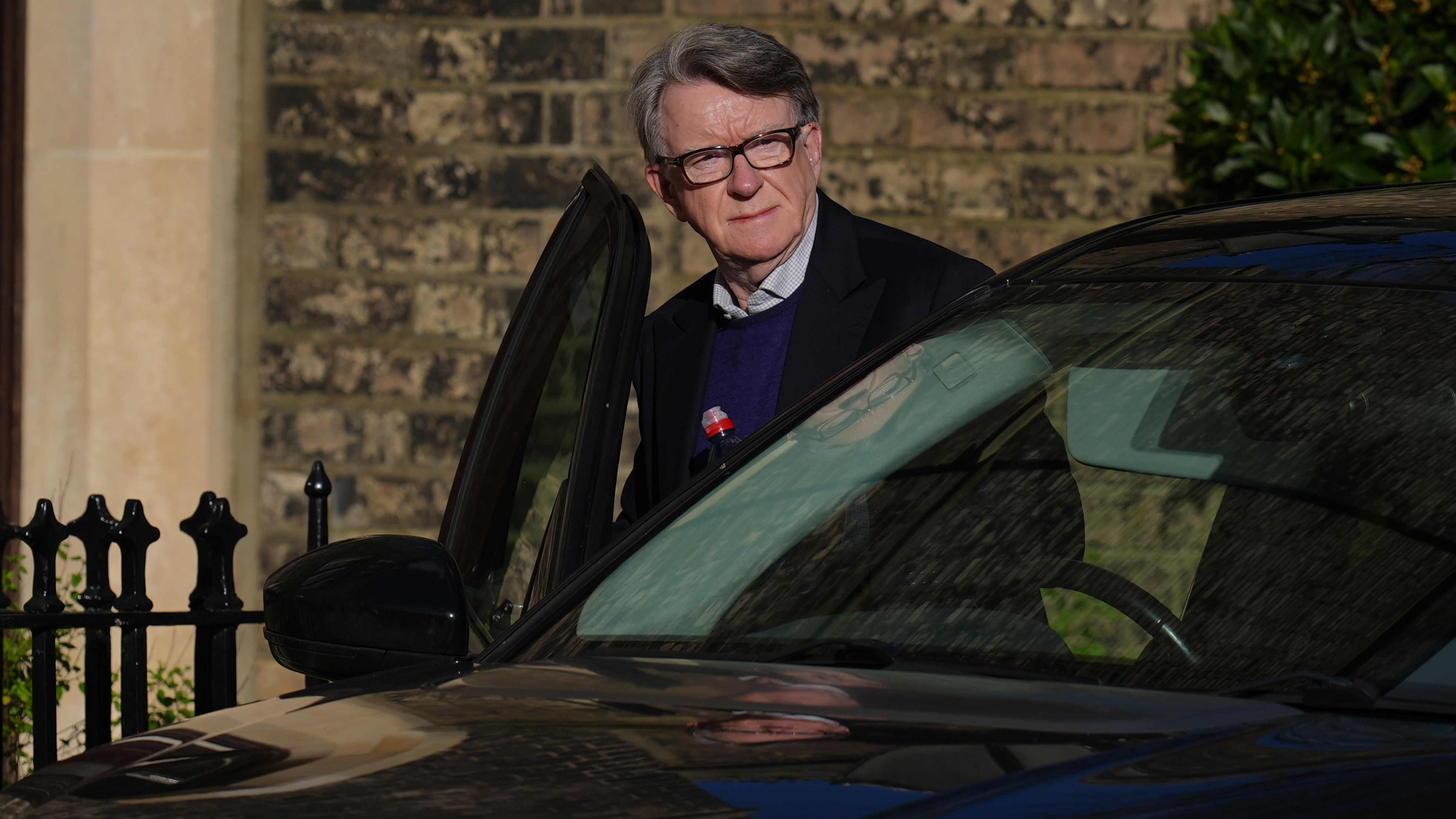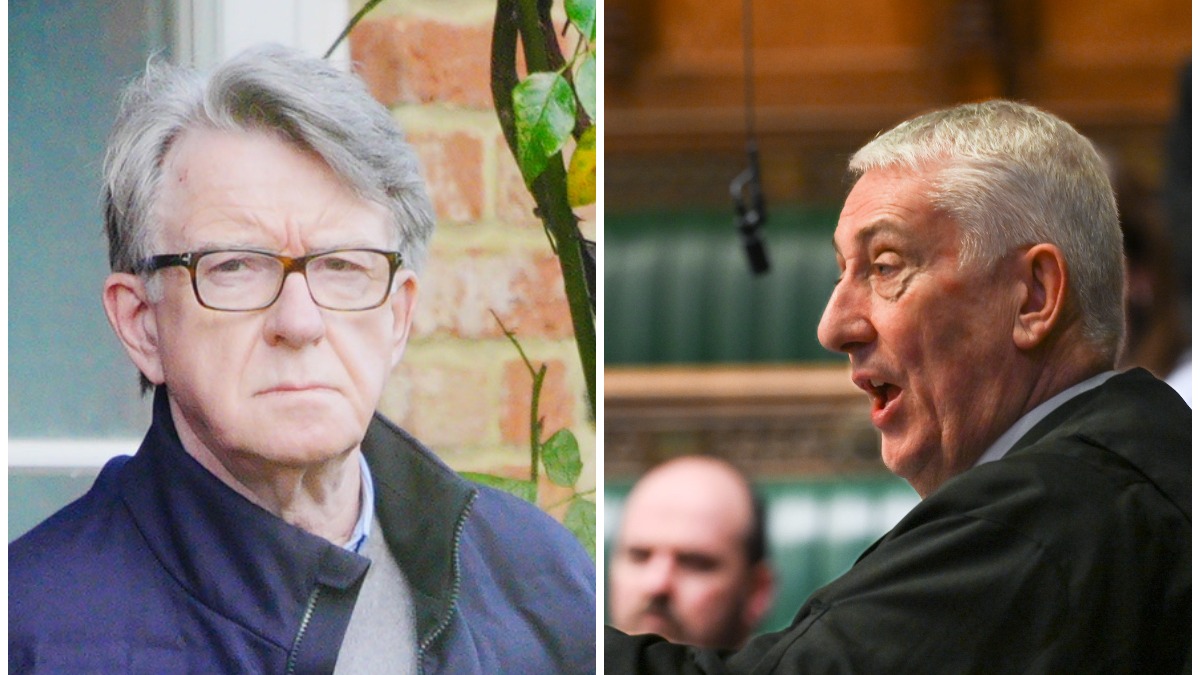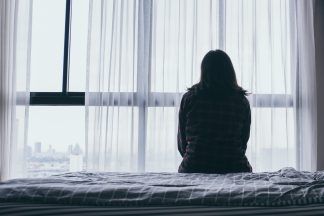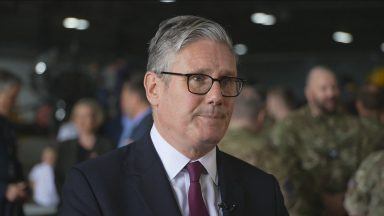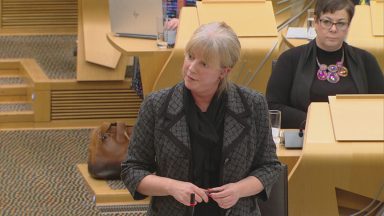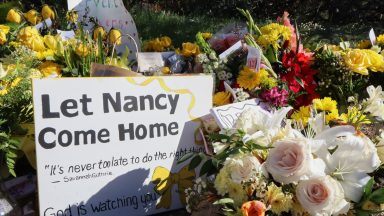Key points
- Humza Yousaf has been voted in as First Minister of Scotland with help from Green MSPs.
- Labour, Tory and LibDem leaders put themselves forward for First Minister but were unsuccessful.
- The SNP leader says it is the ‘privilege of my life to serve Scotland’.
- Opposition parties urge the First Minister to focus on the cost of living crisis and the NHS.
Humza Yousaf has become Scotland’s sixth First Minister after being voted in by a majority of MSPs at the Scottish Parliament.
The vote, which took place on Tuesday afternoon, makes Yousaf the first person of colour to hold the role.
The presiding officer will now put his nomination to King Charles and he will be officially sworn in as the First Minister of Scotland at the Court of Session on Wednesday.
Yousaf said it is the “privilege of his life” to stand as Scotland’s leader and vowed to ensure the country’s “best days lie ahead”.
He said his Government would “listen carefully and pay respect” to the views of all MSPs while standing up to any attempts to “undermine devolution”.
Scottish Tory leader Douglas Ross, Labour leader Anas Sarwar and Liberal Democrat leader Alex Cole-Hamilton all put themselves forward for First Minister but were unsuccessful.

Yousaf is both the first Muslim First Minister and the youngest person ever to hold the role at the age of 37.
Speaking ahead of the vote, he referred to the fact that he and Scottish Labour leader Anas Sarwar are of Pakistani Muslim heritage.
“It’s quite a signal of the progress that we have made as a country, as well as a Parliament, that two of the candidates putting themselves forward are from minority ethnic communities,” he said.
Yousaf received 71 votes for First Minister, with all SNP MSPs and all seven Scottish Green MSPs voting for him.
The leaders have reaffirmed their support for the Bute House Agreement – a power-sharing deal that gave Yousaf’s party the majority it needs to pass legislation and saw the Greens enter government.
On Monday, he was announced as the new leader of the SNP after narrowly beating rival Kate Forbes.
He takes over from Nicola Sturgeon, who announced her resignation last month after more than eight years in office.
Accused of being a “continuity candidate” by his leadership rivals, Yousaf has been a close ally of Sturgeon, having served under her in several cabinet roles.
He last served as health secretary and has been attacked by opposition parties for presiding over record A&E waiting times.
During his winning speech on Monday, Yousaf vowed to tackle the cost of living crisis and reform Scotland’s NHS.
The SNP leader has faced calls from Labour to announce an election, with MSP Jackie Baillie accusing him of lacking a mandate.
But the First Minister has rejected that, saying his mandate comes from the MSPs who voted him through.
How many votes did each candidate receive?
SNP leader Humza Yousaf: 71 (64 from SNP and seven from Greens)
Scottish Conservative leader Douglas Ross: 31
Labour leader Anas Sarwar: 22
Liberal Democrat leader Alex Cole-Hamilton: 4
What did Humza Yousaf say in his first speech as First Minister?
In his first speech since becoming Scotland’s First Minister, Yousaf quoted Donald Dewar.
He said: “Donald Dewar emphasised, and I quote, ‘the common aims that we shared across this chamber of giving people a better life and a better future’.”
He went on to pay tribute to his parents, saying “I could not be making history without them”, adding that his wife and daughters “are my everything”.
Yousaf spoke about his experience as a politician of colour in Scotland, saying that racial abuse against him was so bad he “felt I simply did not belong here”.
He told MSPs: “I’ve lost count of how many times my identity, my loyalty to Scotland – the only country I have ever and will ever call home – has been questioned over the years.
“There was a time not that long ago when I felt I simply did not belong here.”
He said he would champion people who have felt the same in his time in office, saying he hoped his election “sends a strong message to every single person out there who feels that they don’t belong”.
“No matter what anyone says, no matter who you are, whether Scotland has been your home for a day or for 10 generations, no matter your ethnicity, no matter your gender, no matter your religion, no matter your sexual orientation, your transgender identity or disability, this is your home and don’t let anyone ever tell you that you do not belong.”
He said he would lay out detailed policies to Holyrood after the April recess.
His government, he said, would prioritise the fight against the cost-of-living crisis and he will speak to anti-poverty groups in one of his first engagements as First Minister.
He added that he will seek to reform the NHS and social care, extend childcare, maintain the promise made to care experienced young people, reform criminal justice and tackle drug deaths.
Yousaf went on to say he hoped to “build on the record” of Nicola Sturgeon and John Swinney, to whom he paid tribute in his first Holyrood speech as First Minister.
He added that he will “strive every minute of every day” to be worthy of the honour of being First Minister.
He said: “This parliament has just given me the opportunity to help steer this nation’s course as we make the next stage of that journey together.
“Doing that will be the honour and the privilege of my life.
“I will strive every single minute of every day to be worthy of it.”
The newly-appointed leader paid tribute to his first political mentor, the late MSP Bashir Ahmad – for whom he worked in his early political career – describing him as “by far the kindest and most gentle soul I’ve ever known”.
“He used to say that it isn’t important where you come from, what matters is where we are going together as a nation,” he said.
“It’s a phrase I think of often, it’s a phrase that will guide how I and my government governs.”
What did the opposition parties say?
Labour described Humza Yousaf as the “worst health secretary of all time” and said the SNP did not have the Scottish people’s priorities at heart.
The Greens welcomed Yousaf’s election and lauded him as a firm supporter of the Bute House Agreement.
The Liberal Democrats called for Yousaf to tackle the crisis in the NHS and announce a minister for mental health.
Tory leader Douglas Ross meanwhile accused the First Minister of continuing his predecessor’s “obsession” with independence.
He also said Yousaf’s election makes him the only major party leader not to have been privately educated.
Both Yousaf and Labour Party leader Anas Sarwar attended the fee-paying Hutchesons’ Grammar School in Glasgow.
Green Party co-leaders Patrick Harvie and Lorna Slater, and the Liberal Democrats’ Alex Cole-Hamilton, also attended state schools.
What did the UK Government say?
Rishi Sunak said he was “looking forward to having a dialogue” with Humza Yousaf.
Asked if he had already rejected the new First Minister’s call for a Section 30 order allowing a second independence referendum, the Prime Minister told MPs: “I have not had the opportunity to talk to the new First Minister yet, so I look forward to doing that.”
In response to questions from the SNP’s Angus MacNeil at the Liaison Committee, Sunak said: “I look forward to having that conversation with him.”
Pressed on whether the next general election should be viewed as an effective referendum on independence, Mr Sunak said “I think in elections people vote on all sorts of different things” and it was “not appropriate to try and hijack” it for a single issue.
“People in Scotland will vote on the various issues they think are important to them,” he said.
And Scottish secretary Alister Jack said: “My congratulations go to Humza Yousaf on being elected as the new First Minister of Scotland.
“The UK Government wants to work constructively with him on the issues that matter to people in Scotland. I was pleased that during his acceptance speech Mr Yousaf made clear he also wants to work together. That is what people in Scotland, rightly, expect.
“There is a huge amount to be done – continuing to tackle the cost of living, growing Scotland’s economy, tackling NHS waiting lists, ensuring our energy security and improving transport links.
“I hope that Mr Yousaf will govern for the whole of Scotland. In particular, I hope he will put his obsession with independence aside and concentrate on working with the UK Government to make life better for people in Scotland.”
Follow STV News on WhatsApp
Scan the QR code on your mobile device for all the latest news from around the country


